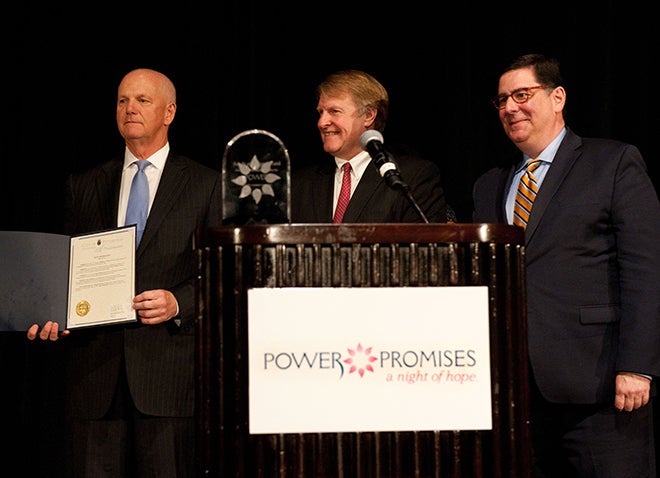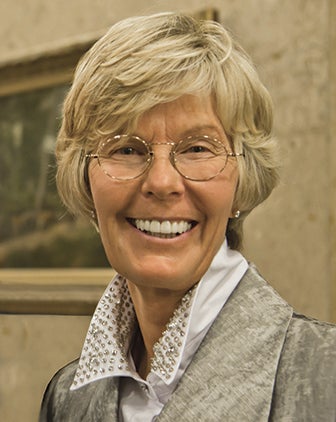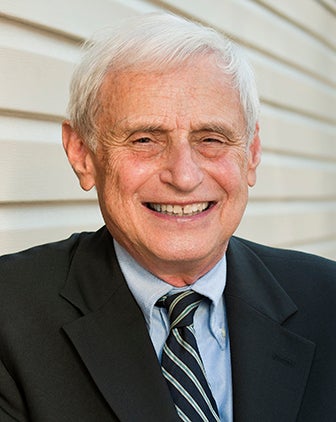
Subscribe to Pittwire Today
Get the most interesting and important stories from the University of Pittsburgh.Center’s Pitt Connections Run Deep
Beth was an international marketing professional who traveled the globe for her career. Until one night, after a fight with her husband, she took two pills for her migraine headache rather than one.
Caitlin grew up in an abusive household and turned to alcohol and Xanax at age 12 to escape.
Jaymee broke her finger in a car accident and was prescribed Vicodin, to which she eventually became addicted.
The roads to recovery for the three women began with the help of POWER (Pennsylvania Organization for Women in Early Recovery), an organization with bonds to the University of Pittsburgh.
The women were honored May 18 at the annual POWER Promises philanthropic event, along with a man they see as a champion – David Hickton, who is a fellow within Pitt’s Institute of Politics and founding director of the Pitt Institute for Cyber Law, Policy, and Security.
Hickton received the Seeds of Hope Award, which is given to individuals or groups who have made a significant impact in the field of addiction.
The POWER House in Swissvale is a halfway house specifically for women. The organization’s founding as well as its ongoing work is rich with Pitt connections. More than 400 people — POWER alumni, supporters, friends and sponsors — recently packed the Westin Convention Center Ballroom for the event, which has raised $2.6 million to date for the organization.
While he served as U.S. Attorney for Western Pennsylvania, Hickton brought together representatives from public health and public safety to form the Working Group on Drug Overdoses and Addiction. He focused on large-scale heroin traffickers, increasing arrests four-fold. He also co-chaired the National Heroin Task Force and worked to reduce the stigma associated with heroin use.
“He is a huge advocate for treatment as opposed to punishment,” said POWER Director of Development and Pitt alumna Madelon Edelstone (EDUC ’83G).
In accepting the award, Hickton told those gathered that there is still a “deficit of treatment."
“We wanted to change the way people think about the opioid crisis,” he said. “And we dared to believe we could make a meaningful difference.”
Now, in conjunction with Pitt’s Institute of Politics, Hickton’s work on the opioid crisis will continue.
Last fall, the Institute released A Continuum of Care Approach, a report that outlines a comprehensive education and intervention strategy to combat the epidemic, compiled by public health researchers and public safety experts.
Now the report is being introduced through workshops in 25 counties, focusing on particular needs in each county — be it how to use a Prescription Drug Monitoring Program to spot “doctor shoppers,” or how best to introduce drug awareness in elementary schools.
Pitt’s connection to POWER dates to 1991, when it was founded by then-Pitt student and now Institute of Politics Director Terry Miller, who recognized at that time that women needed a gender-specific approach to drug or alcohol addiction. At the time, she was earning a bachelor’s degree in social work at Pitt and was already working with patients with substance issues in Turtle Creek.
POWER customizes its treatment model to women, some of whom may be dealing with other issues, such as eating disorders, domestic violence or childhood sexual abuse.
“Once you take the drugs or alcohol out of the picture, the woman can focus on unpacking these other issues,” said Miller.
Moe Coleman, Pitt professor emeritus of social work, was Miller’s advisor in 1991 and encouraged her along the way.
“Terry used her skill and creativity in securing the building, raising funds and getting input from the community,” he said. “I was a little worried about the community response, but it was presented to them that founding POWER was just the moral thing to do,” Coleman said.
The organization received crucial support from then-state representative Tom Murphy, who offered his office space for early meetings, helped identify possible sites for POWER House and kept a watchful eye on the proposal as it made its way through the state Legislature.
Now, 26 years later, there have been many successes. POWER has been under the longtime direction of Pitt alumna Rosa Davis (SOC WK ’81, ’86G). POWER has added an outpatient component and a robust mentoring program that supports women through their recovery.
And Miller and Coleman are enthused about continuing to work with Hickton, who has brought broad vision and leadership to this issue.
They said he’s helping to spread an important message.
“We want people to understand,” said Miller. “It’s not about bad people becoming good. It’s about sick people getting well.”





